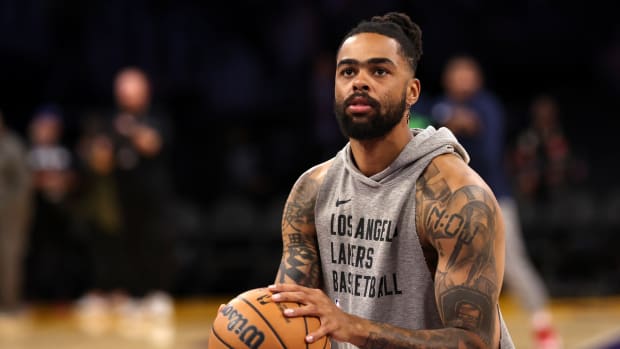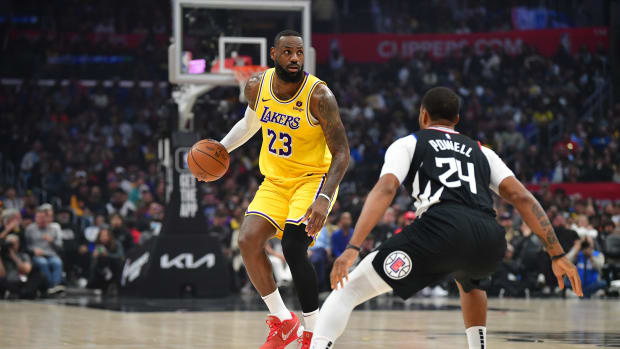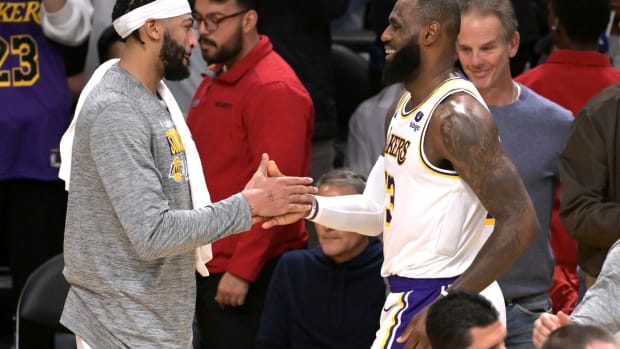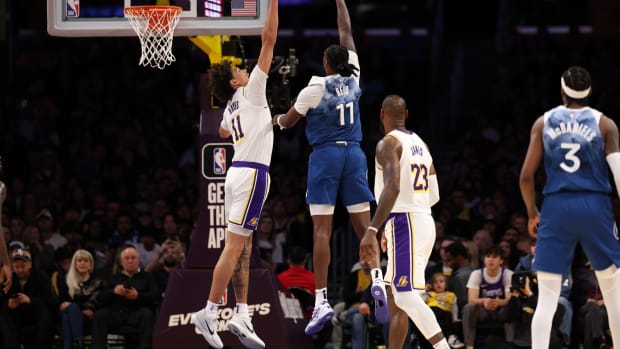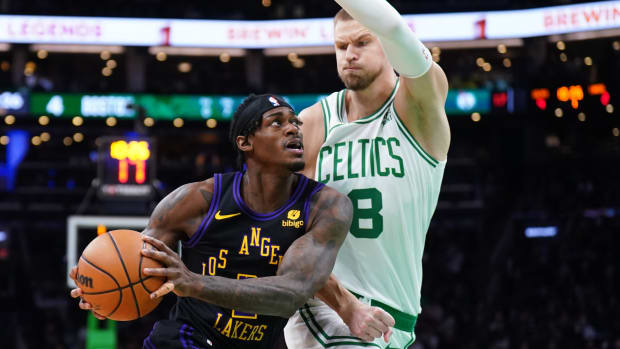Lakers News: "Legacy" Week 7 Recap - A Series Of Bitter Divorces
The soap opera that was the Shaquille O'Neal-Kobe Bryant Lakers gets recollected in another fresh edition of the Jeanie Buss-produced "Legacy: The True Story Of The L.A. Lakers," out on Hulu today.
Director Antoine Fuqua's in-depth look at your Los Angeles, from the time of their purchase by one of the best sports owners ever, Dr. Jerry Buss, through to their current stewardship under his daughter, Jeanie, kicks off in an interesting fashion. We discover that the eldest Buss kid, Johnny, was excluded from the Lakers' 2000 title celebration. The infamously violent fan rioting outside Staples Center is shown fleetingly.
Change was brewing internally after the Lakers beat the Pacers to win their first title in a dozen years. Team president Jerry West ultimately decided to leave the team for a new challenge: helping guide the Memphis Grizzlies to the promised land.
"People think I don't like Phil Jackson," West says in his modern interview. "That's not true at all. Great respect for him. But he and I are two different people."
"From my standpoint, you know, Jerry and I had a very workable relationship," Jackson says today.
This would be Phil's second chilly separation from a team president named Jerry in three seasons. And he sat out from the league during one of those seasons! Jackson apparently iced out West, going so far as to loudly berate him when he tried to show up for team locker room meetings.
"Long as you're winning that's fine with me," West says. "But I knew that I wasn't gonna be around there much longer." Johnny Buss contends that West had wanted to get involve in ownership, something Jerry Buss was not amenable to.
West's departure was fairly quiet, to the point where Shaquille O'Neal only discovered it had happened by reading his morning paper. Mitch Kupchak was promoted to president. In a new interview, Brian Shaw relays that O'Neal and Bryant didn't show particular respect toward Kupchak at the beginning, to the point where O'Neal even now maintains a refusal to discuss Kupchak. "I'm a Jerry West guy," he asserts.
"I was very upset," O'Neal says now of West leaving. "I'm only here 'cause of him. I actually tried to stick up for him, and he says, 'Nope, stand down big fella, let me handle it.'"
The documentary then speeds through the 2000-01 regular season and the team's then-historic sweep of its Western Conference postseason foes. It lands on the 2001 Finals, featuring a Game 1 performance for the ages courtesy of that year's league MVP, Philadelphia 76ers point guard Allen Iverson.
We think fast forward to the historic Sacramento Kings series in the 2002 Western Conference Finals, described by J.A. Adande as a "bloody, all-out battle." Former Lakers center Vlade Divac, traded to Charlotte as part of West's 1996 Kobe Bryant trade, was now starting for the other side. The Robert Horry series-tying triple in Game 4 that earned him the nicknames "Big Shot Rob" and "Big Shot Bob" is paid special attention.
Former Showtime Lakers shooting guard Byron Scott was by this point the head coach of the New Jersey Nets, the eventual 2002 Finals opponent of the Lakers. Future Lakers assistant coach Jason Kidd was then the All-Star starting point guard for the 52-30 Nets. To the tune of "In Da Club" by 50 Cent (which was actually released a year later, 2003), we are treated to a montage of the Lakers sweeping the Nets to win their third straight NBA championship.
“Winning three in a row, that’s some elite stuff right there,” asserts Robert Horry.
During this era, the Los Angeles Sparks, run by team president Johnny Buss, won two straight WNBA championships thanks in large part to the play of two-time Finals MVP center Lisa Leslie. Head coach Michael Cooper, a former Showtime Laker, served as steward for that formative Sparks club. Overwhelmed by the business, Johnny ultimately decided to step away. Dr. Jerry Buss sold ownership of the team for $10 million in 2006.
After being swept by the eventual champion San Antonio Spurs in the second round of the 2003 playoffs, the Lakers decided to re-tool, bringing in Hall of Famers Gary Payton and Karl Malone and hoping for a 70+ win season in 2003-04.
But it was not to be.
Kobe Bryant's Colorado assault trial hung over the 2003-04 season like a storm cloud. Bryant and O'Neal renewed their swiping through the press, to the point where Phil Jackson and Mitch Kupchak felt compelled to sit both players down (separately) and try to impress on them the importance of not berating each other to the media, threatening to fine them.
Per a present-day Kupchak interview, Kupchak met with Bryant, who promised him the team president he understood and would stop publicly arguing with O'Neal... and on his way home from the team's El Segundo practice facility, he called Jim Gray to publicly argue with O'Neal some more. The team brought in former Laker veteran Brian Shaw once again to try to mitigate some of the damage.
Carmelo Anthony reflected on how Bryant flew in from his court case to take the floor after the first half of an early-season Nuggets-Lakers game, and though he struggled to score efficiently, he did nail a game winner to help L.A. seal the victory.
Bryant also decided to opt out of the final year of his contract so that he could enter unrestricted free agency in 2004. Jackson, meanwhile, approach Mitch Kupchak, essentially giving the Lakers team president a "him-or-me" ultimatum with regards to the future of Bryant and himself on the team. In an old interview from around this era, Jackson was honest about the conversation: "The essence of what I said is, 'I don't think I can coach Kobe anymore, I can't reach him. And if you want me to continue on with this ball club, then change has to be made. And if you want Kobe on this ball club, then I have to go.'"
Kupchak now retorts in his modern interview. "You're the coach, you figure it out," Kupchak says. "But if it comes down to Kobe or you, I'm keeping Kobe."
The future of O'Neal was also uncertain. The 7'1" center was hoping for a maximum contract extension with L.A., but Kupchak reveals that the Lakers front office and the 32-year-old big man were unable to come to terms on a deal.
The Lakers went 56-26 for the season, securing the second seed in the West. The team would of course go on to lose 4-1 to the Detroit Pistons, led by Ben Wallace, Rasheed Wallace, Chauncey Billups, and Rip Hamilton.
"I think basketball coaches are effective for five years, I really do," the late Dr. Buss said of Jackson's subsequent offseason firing. Jackson of course by this point was living with Dr. Buss's daughter Jeanie, who still worked for the Lakers. "That whole situation just ran its course and it was time to start fresh." Shaquille O'Neal was not informed that Jackson was let go prior to the hammer coming down.
Jackson would return to the team after one season away, in 2005-06.
The documentary then covers the team's decision to trade O'Neal to the Miami Heat, and Bryant's ascent to top dog status in Los Angeles.


